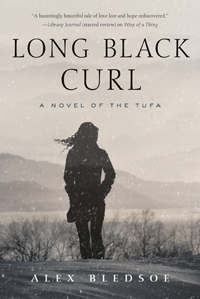Backwoods Refrain
Feuding turns mystical and musical in Long Black Curl, the third volume in Alex Bledsoe’s Tufa series
In Long Black Curl, the latest installment in Alex Bledsoe’s Tufa series, Appalachian blood feuds recur through the generations like repetitions of an Irish reel. When Bo-Kate Wisby, an exiled daughter of Cloud County, returns home, she initiates a brutal power struggle that will test the agendas and loyalties of her people, the Tufa.
 Long Black Curl hinges on the mysterious traditions of this clan, whose presence in Cloud County, Tennessee, is rumored to predate even the earliest European and Native American settlers. Throughout the generations, the Tufa have become known for their secretive rituals, indefinable ethnic background, fierce defense of their turf, and eerily formidable musicianship. But the Tufa’s power appears to stretch beyond these features: their otherworldly qualities include a “malleable relationship to time” and an ability to sense impending dangers by “listening” to the night winds.
Long Black Curl hinges on the mysterious traditions of this clan, whose presence in Cloud County, Tennessee, is rumored to predate even the earliest European and Native American settlers. Throughout the generations, the Tufa have become known for their secretive rituals, indefinable ethnic background, fierce defense of their turf, and eerily formidable musicianship. But the Tufa’s power appears to stretch beyond these features: their otherworldly qualities include a “malleable relationship to time” and an ability to sense impending dangers by “listening” to the night winds.
Early in the novel, Bo-Kate makes a bloody play for power as soon as she rolls into Cloud County, in defiance of the fact that the clan had long ago banished her and her lover, Jefferson. She openly challenges the divisions carefully negotiated by two acrimonious Tufa factions. Word spreads quickly throughout Cloud County, and prominent citizens must scramble for a plan. Twelve-year-old Mandalay Harris is already struggling to understand her own mystically imbued inheritance—a gift of leadership endowed upon First Daughters. In that context, she wonders, what does this new struggle mean? Has she been pushed to the front lines? Meanwhile, an elusive group of Tufa men, the Silent Sons, have their own concerns. Even Bo-Kate’s partner in exile, Jefferson, soon enters the fray.
 In Long Black Curl, Bledsoe weaves fantastical elements together with the real-world dangers and brutalities sometimes found in Appalachian culture. Features of Celtic tradition strongly inform the world of the Tufa, whose origin story draws from early, non-Tinkerbell depictions of faeries. Separated from their ancestral land, the Tufa’s arrival in the Smoky Mountains alters them irrevocably: “When the original exiles had landed here, back when the Appalachians were as high and rugged as the Rockies, they had bonded with the rock and soil and trees just as they’d once done in their original home.”
In Long Black Curl, Bledsoe weaves fantastical elements together with the real-world dangers and brutalities sometimes found in Appalachian culture. Features of Celtic tradition strongly inform the world of the Tufa, whose origin story draws from early, non-Tinkerbell depictions of faeries. Separated from their ancestral land, the Tufa’s arrival in the Smoky Mountains alters them irrevocably: “When the original exiles had landed here, back when the Appalachians were as high and rugged as the Rockies, they had bonded with the rock and soil and trees just as they’d once done in their original home.”
Tufa mythology also engages the tradition of ballad singing, integral to the clan’s sense of identity in the mountains of East Tennessee: “The songs they brought with them became tunes about the land they now inhabited,” writes Bledsoe, “and the original songs they composed sealed that relationship like the first marital kiss at a wedding.” The Tufa have learned to wield the power of these songs in ways that go beyond the symbolic, tapping into a mystical force that bends time and space, summons preternatural insight during tough dilemmas, or curses a transgressing member of the community. Bledsoe incorporates a wide range of songs—from nineteenth-century murder ballads to fifties rockabilly to Tori Amos—into his characters’ storylines, emphasizing the Tufa’s ability to tap the power of song as a living, changeable force.
Even readers who don’t typically reach for fantasy or horror novels, if they appreciate the wealth of writing that depicts Appalachian culture, may find Long Black Curl a welcome surprise. Bledsoe’s Tufa novels offer an idiosyncratic, inventive take on Appalachian traditions.

Emily Choate holds an M.F.A. from Sarah Lawrence College. Her fiction is forthcoming from The Florida Review, Tupelo Quarterly, and The Double Dealer, and her nonfiction has appeared in Late Night Library, Yemassee, and elsewhere. She lives in Nashville, where she’s working on a novel.


